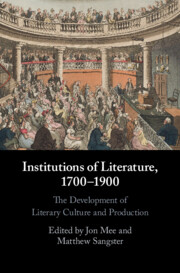Book contents
- Institutions of Literature, 1700–1900
- Institutions of Literature, 1700–1900
- Copyright page
- Contents
- Figures
- Contributors
- Acknowledgements
- Introduction Literature and Institutions
- Chapter 1 Knowledge Exchange in the Seventeenth Century
- Chapter 2 ‘Supporting Mutual Benevolence’
- Chapter 3 Institutions without Addresses
- Chapter 4 Eighteenth-Century Musenhof Courts as Bridges and Brokers for Cultural Networks and Social Reform
- Chapter 5 Becoming Institutional
- Chapter 6 Circulating Libraries as Institutional Creators of Genres
- Chapter 7 Lecturing Networks and Cultural Institutions, 1740–1830
- Chapter 8 Catalogues as Instituting Genres of the Nineteenth-Century Museum
- Chapter 9 Charles Lamb and the British Museum as an Institution of Literature
- Chapter 10 A Disruptive and Dangerous Education and the Wealth of the Nation
- Chapter 11 ‘The Ladies’ Contribution’
- Chapter 12 ‘[L]etters Must Increase’
- Chapter 13 Networks, Nodes, and Beacons
- Chapter 14 The Book as Medium
- Index
Chapter 11 - ‘The Ladies’ Contribution’
Women and the Mechanics’ Institute on the Goldfields of Victoria
Published online by Cambridge University Press: 30 June 2022
- Institutions of Literature, 1700–1900
- Institutions of Literature, 1700–1900
- Copyright page
- Contents
- Figures
- Contributors
- Acknowledgements
- Introduction Literature and Institutions
- Chapter 1 Knowledge Exchange in the Seventeenth Century
- Chapter 2 ‘Supporting Mutual Benevolence’
- Chapter 3 Institutions without Addresses
- Chapter 4 Eighteenth-Century Musenhof Courts as Bridges and Brokers for Cultural Networks and Social Reform
- Chapter 5 Becoming Institutional
- Chapter 6 Circulating Libraries as Institutional Creators of Genres
- Chapter 7 Lecturing Networks and Cultural Institutions, 1740–1830
- Chapter 8 Catalogues as Instituting Genres of the Nineteenth-Century Museum
- Chapter 9 Charles Lamb and the British Museum as an Institution of Literature
- Chapter 10 A Disruptive and Dangerous Education and the Wealth of the Nation
- Chapter 11 ‘The Ladies’ Contribution’
- Chapter 12 ‘[L]etters Must Increase’
- Chapter 13 Networks, Nodes, and Beacons
- Chapter 14 The Book as Medium
- Index
Summary
During a soirée commemorating the third anniversary of the Beechworth Athenaeum in the colony of Victoria in 1859, the society’s secretary acknowledged the ‘immense influence exercised by the ladies in the success or decline of an institution of this nature’. Mechanics’ Institutes emerged in nineteenth-century Britain before proliferating in the colonies to become thriving social, literary, and cultural hubs. While they were ostensibly male-focused institutions, women were critical in securing the mechanics’ institutes’ social and financial success, especially on the Victorian goldfields. Although they were originally unable to serve on the committees and only allowed ‘associate’ or ‘lady’ membership rights through their husbands or fathers, women attended lectures, participated in soirées, bazaars and popular readings and were frequently encouraged to do so by the institutes. Through its analysis of surviving committee minute books, institutional correspondence, and gold-rush era newspaper reports, this chapter demonstrates how the social respectability of colonial women and the Mechanics’ Institutes could be mutually constitutive, providing women with opportunities and platforms for public and political engagement, while also revealing the acts of resistance to institutional forms of surveillance and moral policing.
Keywords
- Type
- Chapter
- Information
- Institutions of Literature, 1700–1900 , pp. 215 - 233Publisher: Cambridge University PressPrint publication year: 2022



